Easter Sunday
Sunday April 5, 2026
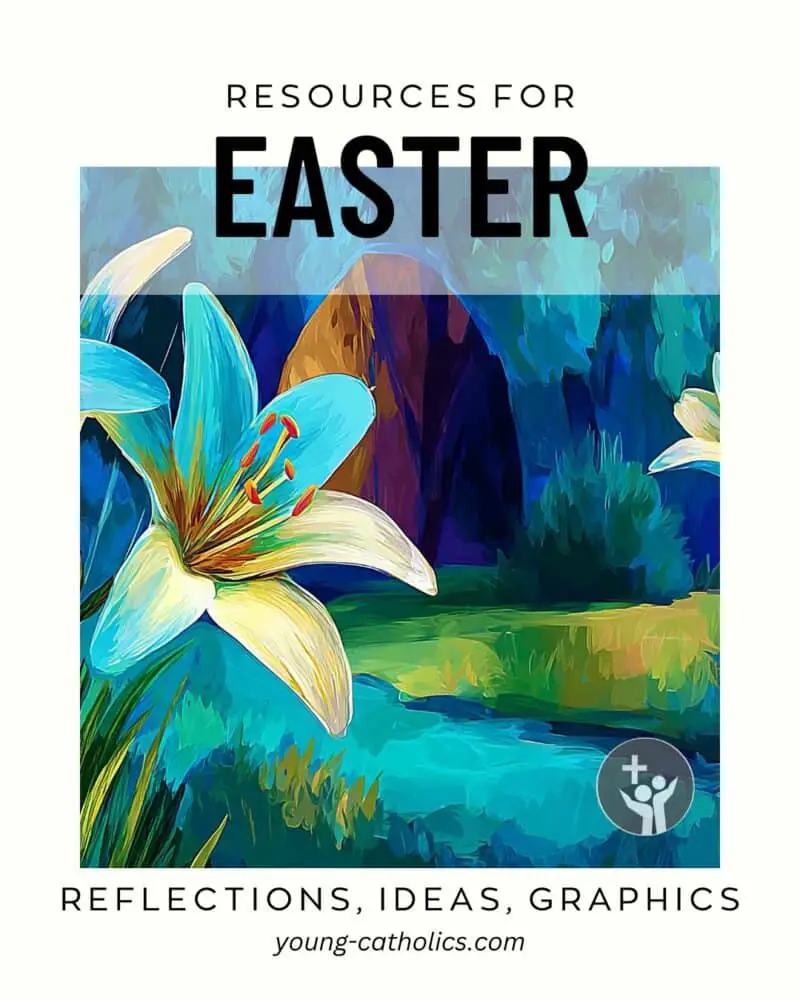
Easter stands at the pinnacle of the Christian liturgical year, celebrating the resurrection of Jesus Christ from the dead, a cornerstone of faith promising redemption and eternal life to humanity.
At the heart of this jubilant time is Easter Sunday, a day brimming with the joy of the Risen Lord, which also begins the Easter Octave—eight days of unbroken celebration, each treated as though they are one and the same day. This period invites us into deep reflection and joy over the life-giving mysteries of Christ’s triumph over death.
The Octave of Easter is an extended season of joy, underscoring the central truth of Christian faith: Christ’s victory over death and sin. Throughout this time, the faithful engage in daily Masses that resonate with Easter’s hopeful and renewing message, culminating on Divine Mercy Sunday. This special day highlights God’s endless mercy and love.
Easter and the ensuing Octave are not just remembrances of a past event but are invitations into a more profound, personal encounter with the Risen Christ today. This season ushers in a time of new beginnings and divine grace, offering a pathway to spiritual renewal and deeper connection with the essence of our faith.
Easter Sunday Readings (Vigil Mass)
(At least three, and up to all seven of the readings from the Old Testament below are used at the Vigil Mass. The third reading from Exodus 14 must always be included.)
- First Reading – Genesis 1:1-2:2 : The biblical account of the creation of the world by God in six days. In this passage, God creates light, the sky, land, seas, vegetation, animals, and humans, and rests on the seventh day.
- First Responsorial Psalm – Psalm 104: In awe, I praise God’s grandeur, clothed in the universe’s splendor. He established the earth, nourished it, and filled it with life. Through His wisdom, all creation thrives, echoing a call for the Spirit’s renewal upon the earth.
- Alternate First Responsorial Psalm – Psalm 33: The Lord’s word is flawless, guiding us with fairness. His creative power and the care for His creation reflect His immense kindness. Blessed are those who find their strength in Him, as we await His steadfast love and protection.
- Second Reading – Genesis 22:1-18: The story of God testing Abraham’s faith by asking him to sacrifice his son Isaac. Abraham obeys, but God ultimately provides a ram as a substitute sacrifice and blesses Abraham for his unwavering faith.
- Second Responsorial Psalm – Psalm 16: The Lord secures my destiny, His presence a constant guide. In Him, my heart finds joy and my body peace, for He promises life beyond death, guiding me to eternal delight in His presence.
- Third Reading – Exodus 14:15-15:1: The account of the Israelites crossing the Red Sea and the destruction of the Egyptian army. Moses, with God’s help, parts the waters of the sea, allowing the Israelites to cross on dry land, and once they have crossed, the waters close in on the pursuing Egyptian army, drowning them. The passage ends with a song of praise and thanksgiving to God for His deliverance.
- Third Responsorial Psalm – Exodus 15: The Lord’s triumph over adversity is majestic, showcasing His strength as deliverer and warrior. He led His people to safety, demonstrating His power by overcoming foes and establishing a sacred dwelling, proclaiming His eternal reign.
- Fourth Reading – Isaiah 54:5-14: The LORD compares His relationship with His people to a marital bond, promising to bring them back with great compassion after a brief period of abandonment. He assures them of His unshakable love and peace, promising prosperity and security, symbolized by precious stones and an environment free from fear or harm.
- Fourth Responsorial Psalm – Psalm 30: Praising the Lord for lifting me from despair, His deliverance turns sorrow into joy. His enduring favor transforms night’s tears into morning’s joy, warranting lifelong gratitude and celebration of His mercy.
- Fifth Reading – Isaiah 55:1-11: An invitation to all who thirst to come to God and receive His salvation and blessings. It encourages people to turn from their wicked ways and seek God’s mercy, promising that His ways are higher than our ways, and His word will not return to Him empty, but will accomplish its purpose.
- Fifth Responsorial Psalm – Isaiah 12: In the Lord, we find unfailing salvation, a source of strength and jubilation. As we draw from His endless supply of grace, we’re moved to share His wonders and sing praises, celebrating His presence among us with immense joy.
- Sixth Reading – Baruch 3:9-15, 3:32-4:4: Israel is admonished to embrace wisdom for a life of peace. Forsaking wisdom leads to exile and despair, but pursuing it offers understanding and fulfillment. God alone, creator and keeper of the universe, possesses and imparts this wisdom to His people, promising life to those who cling to her teachings.
- Sixth Responsorial Psalm – Psalm 19: God’s laws rejuvenate us, guiding with simplicity and joy. His commands light our path, His decrees everlasting and true, more precious than gold, sweeter than honey, offering us the essence of eternal life.
- Seventh Reading – Ezekiel 36:16-17a, 18-28: A prophecy of restoration and renewal for the people of Israel. The passage describes how God will bring the people back to their land, cleanse them from their sins, and put a new spirit within them, enabling them to follow His commandments and live in righteousness.
- Seventh Responsorial Psalm (when baptism is celebrated) – Psalm 42: My soul deeply longs for God, yearning to be in His sacred presence. Guided by His truth, I aspire to reach His dwelling, to worship joyfully at His altar, fulfilling my deepest spiritual thirst.
- Seventh Responsorial Psalm (when baptism is not celebrated) – Isaiah 12: In the Lord’s salvation, fear is replaced with trust and strength. We joyfully draw from His endless grace, urged to share His glorious works and triumphs with the world. Zion rejoices, for God’s presence among us is our greatest treasure.
- Seventh Responsorial Psalm (alternate, when baptism is not celebrated) – Psalm 51: Requesting a new beginning, I seek God’s presence and the renewal of His spirit within me. His desire is for genuine repentance, not outward rituals. In His grace, joy and guidance are restored, leading the wayward back to His embrace.
- Epistle – Romans 6:3-11: In baptism, we join Christ in death to rise anew, free from sin’s power, assured of sharing in His resurrection. Christ’s victory over death empowers us to live for God.
- Epistle Responsorial Psalm – Psalm 118: Celebrate the LORD’s enduring mercy and His transformative power. His actions, from saving lives to elevating the rejected stone, are wondrous, prompting us to continually offer Him our praises.
- Gospel (Year A) – Matthew 28:1-10: Mary Magdalene and the other Mary found the tomb empty and were told by an angel that Jesus had risen. They met Jesus on the way and were sent to tell his disciples.
- Gospel (Year B) – Mark 16:1-7: Mary Magdalene, Mary, and Salome found Jesus’ tomb open and empty, with an angel informing them of his resurrection and instructing them to tell the disciples and Peter that Jesus would meet them in Galilee, fulfilling his promise.
- Gospel (Year C) – Luke 24:1-12: The women found the tomb empty and were told Jesus had risen. Though others doubted their words, Peter ran to see for himself and returned filled with wonder.
Easter Sunday Readings (Mass during the day)
Sunday April 5, 2026
- First Reading: Acts 10:34a, 37-43: The message of Peter to Cornelius and his household, in which he proclaims the good news of Jesus Christ, his life, teachings, death, and resurrection. Peter affirms that Jesus is the Lord of all, and that those who believe in Him receive forgiveness of sins and new life.
- Responsorial Psalm: Psalm 118: Acknowledging the LORD’s goodness and eternal love, we witness His power and salvation. The once-rejected cornerstone now holds supreme importance, a marvel of divine orchestration. Let’s celebrate this day, a testament to the LORD’s magnificent work.
- Second Reading: Colossians 3:1-4 : Christians should focus on the things above, where Christ is seated at the right hand of God, and to set their minds on heavenly things rather than earthly things.
- Alternate Second Reading: I Corinthians 5:6b-8: Believers in Corinth must get rid of the old leaven of malice and wickedness and to become a new batch of dough without yeast, as they are truly unleavened.
- Gospel: John 20:1-9: Mary Magdalene discovered Jesus’ tomb open and empty, leading Peter and the beloved disciple to investigate. They found only linen wrappings and the head cloth folded, sparking belief in Jesus’ resurrection despite not fully understanding the prophecy.
Do not be amazed! You seek Jesus of Nazareth, the crucified. He has been raised; he is not here. Behold the place where they laid him. But go and tell his disciples and Peter, “He is going before you to Galilee; there you will see him, as he told you.”
Mark 16:6-7
Themes for Easter
The Easter readings focus on the goodness, power, and saving work of God throughout history, culminating in the ultimate victory of Jesus over sin and death through his Resurrection. They also emphasize the importance of faith and trust in God, dying to sin and being raised to new life through baptism, and seeking heavenly things rather than earthly ones.
Easter, as the central feast in the Christian liturgical calendar, encompasses several profound themes that underscore its significance. These themes not only reflect on the resurrection of Jesus Christ but also on the wider implications for humanity and individual believers. Here are the key themes associated with Easter:
- Resurrection: The cornerstone of Easter, celebrating Jesus Christ’s victory over death and his resurrection, symbolizing hope and the promise of eternal life for all believers.
- Renewal and Rebirth: Easter signifies a time of new beginnings, spiritual renewal, and the rebirth of faith, inviting Christians to rejuvenate their lives in the light of Christ’s resurrection.
- Redemption: The celebration emphasizes Jesus’ sacrifice on the cross, highlighting the theme of redemption and the forgiveness of sins for humanity.
- Victory over Sin and Death: Easter underlines the triumph of Jesus over the powers of sin and death, offering believers freedom from sin and the promise of salvation.
- Eternal Life: The resurrection of Jesus opens the way for believers to eternal life with God, stressing the theme of hope for the future beyond death.
- Faith and Belief: Easter is a call to deepen one’s faith and trust in the power of God, who raised Jesus from the dead, reinforcing the foundation of Christian belief.
- Joy and Celebration: Marking the joy of Jesus’ resurrection, Easter is a time of celebration, characterized by joyous liturgies, music, and the proclamation of the “Alleluia,” expressing the happiness of salvation.
- Community and Unity: Easter brings together the Christian community in worship and celebration, emphasizing unity in Christ and the shared experience of faith and resurrection.
- Transformation and Conversion: Reflecting on the transformative power of Jesus’ resurrection, Easter encourages believers to turn away from sin and embrace a life transformed by God’s grace.
- Divine Mercy: Particularly highlighted on the Second Sunday of Easter, also known as Divine Mercy Sunday, this theme focuses on God’s infinite mercy and love, inviting believers to trust in Jesus’ message of mercy and to act mercifully towards others.
These themes weave together to form the rich tapestry of Easter’s significance, each contributing to the deeper understanding and celebration of this pivotal event in Christian faith.
Resources for Easter Sunday
Sunday April 5, 2026
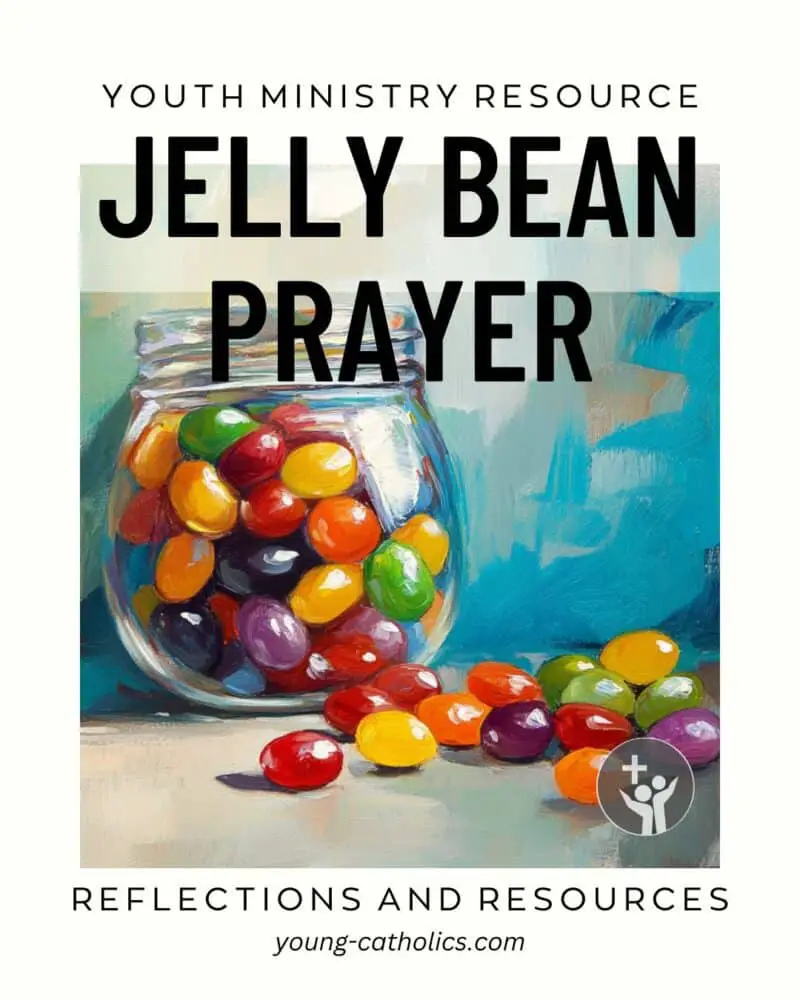
Make Jars with the Jelly Bean Prayer for Easter
The Jelly Bean Prayer is a simple and fun way to celebrate Easter with your family or youth group. Each jelly bean color represents part of the Easter story, using a sweet treat to teach about faith and Jesus’ resurrection. You can fill jars with jelly beans and attach the prayer as a creative way to share the meaning of Easter. This activity is great for teaching and reflecting on the season, especially during the Octave of Easter.
It’s an easy and meaningful way to spread Easter joy while helping others understand the importance of this holy time.
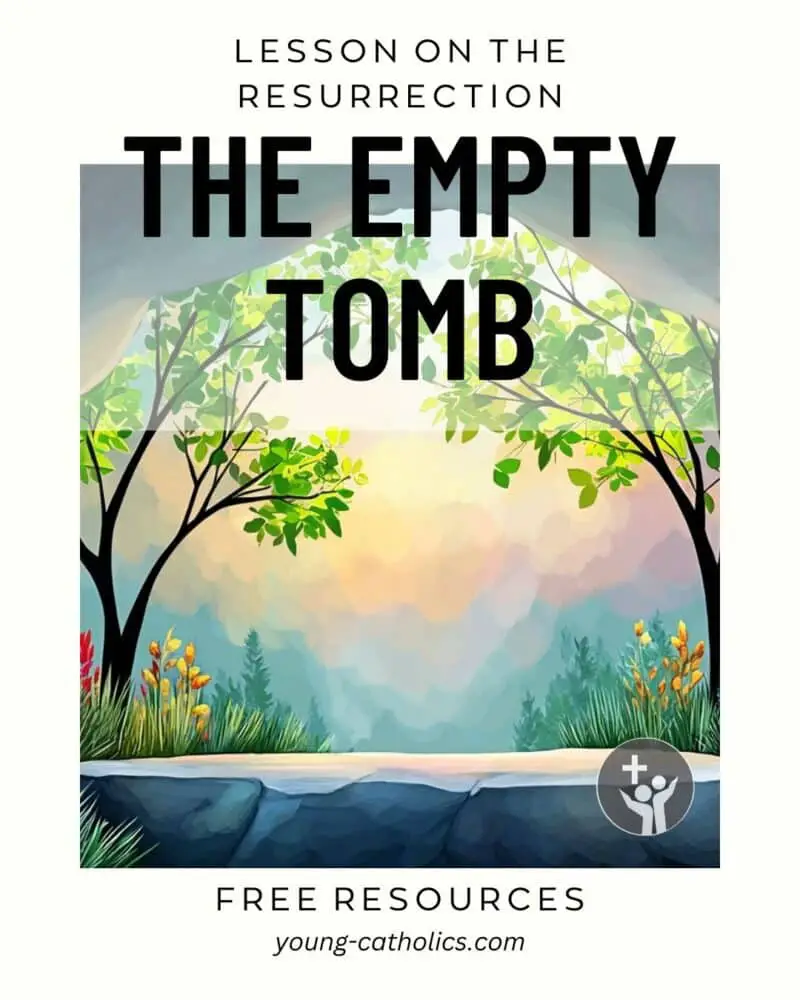
The Empty Tomb: Lesson on the Resurrection
This lesson plan invites youth to explore the moment of Easter when the empty tomb was discovered. Participants imagine themselves at this key event and think about how they might react to the resurrection story from the Gospel of Mark.
The activity encourages discussion and reflection, helping young people connect with the themes of hope, faith, and new life. It offers a simple way to understand the meaning of Christ’s resurrection and how it affects our lives today. This lesson helps bring the Easter story to life in a personal and engaging way.

Glow in the Dark Dodgeball Game
Glow in the Dark Dodgeball is a fun activity for teens on open gym night with an Easter theme. The “resurrection line” lets players rejoin the game, symbolizing renewal and hope, much like the Easter story.
This game isn’t just about fun—it’s a way to explore the idea of light overcoming darkness. It reflects the message of Easter in an active and exciting way. It’s a great way to combine energy, teamwork, and deeper meaning while celebrating the season.
Homilies and Commentaries for Easter
Sunday April 5, 2026
- Something Happened on Easter! (Bishop Robert Barron)
- What Never Dies (Fr. Mike Schmitz)
- Follow the Leader (Dynamic Catholic)
- Flowing Towards the Ocean of Resurrection (Order of Preachers)
- The Empty Tomb and Our Living Faith (USCCB)
- Let Christianity Be Weird! (Bishop Robert Barron)
- How Jesus’ Resurrection Changed the Church (Jeff Cavins)
- Three Easter Lessons (Bishop Robert Barron)
- Running to the Risen Jesus (Ascension Presents)
- They Saw and Believed (Scott Hahn)
Something Happened on Easter!
The Gospel is not just spiritual advice or lofty teaching. It is news—something happened. That is the message of Easter Sunday. Jesus, who died on the cross, has risen. Mary Magdalene finds the stone rolled away, and Peter and John run to see what has taken place. The details are vivid, because this is not myth or theory. It is remembered and told as something real. The empty tomb and the neatly folded burial cloths speak of something far stranger than robbery—Jesus has broken out of death.
In this homily, Bishop Barron explains that the Resurrection turns the world upside down. God’s love is more powerful than death. This changes everything. The first Christians did not spread a new philosophy. They ran to tell the world that God had acted. Easter Sunday is the beginning of a new world, and Christians are called to run out with this good news.
What Never Dies
In his homily for Easter Sunday, Fr. Mike Schmitz reflects on how the Easter Vigil begins in darkness because darkness is real. We all experience grief, confusion, and pain, just like Mary Magdalene, Peter, Tekashi Nagai, and Helen Keller. But each of them chose to rise in the darkness and do what they could. Jesus also entered into destruction, death, and darkness, but he rose and conquered it. His resurrection proves that darkness does not have the last word.
Fr. Mike reminds us that because Jesus rose, we can live with hope. We can get up and do what we can, even when things feel dark. Those baptized and confirmed at the Easter Vigil were marked by the one who never dies. That moment becomes a touch point, a reminder that even in darkness, God is with us. Like Pascal wrote after his encounter with Jesus—joy, peace, and certainty are possible, because Jesus is alive.
Follow the Leader
On Easter Sunday, we hear how John reached the empty tomb first, but waited for Peter to go in. This moment shows respect and humility. It reminds us that in the early Church, there was order and honor. Even in a moment of shock and discovery, John waited. This teaches us something about following, about giving others their place, and about waiting with patience and trust.
Matthew Kelly points out how good followers often become great leaders. He invites us to look at how we follow Jesus. Do we obey what God is asking of us? Or do we resist? Easter Sunday is not just about what happened, but also why it matters. It calls us to deeper reflection on what drives us, what we choose, and why we act the way we do. This is how we grow in spiritual awareness and become more of who God made us to be.
Flowing Towards the Ocean of Resurrection
In this reflection for Easter Sunday, Sr. Judith Anne O’Sullivan tells the story of Mary Magdalene finding the empty tomb and the disciples’ journey to understanding the Resurrection. She speaks about how Jesus had been drawing his followers closer to the Father, even when they did not fully understand. Like a river flowing into the ocean, we are drawn deeper into God’s love.
Sr. Judith Anne shares how death and resurrection are part of this movement toward union with God. As Jesus surrendered to the Father, we are also called to surrender and trust. New life comes when we let go and allow ourselves to be embraced by God’s love. The Risen Lord calls each of us by name, inviting us to share the good news of hope with a hurting world. Christ’s Resurrection is not just a past event—it continues to surprise and send us forth with joy.
The Empty Tomb and Our Living Faith
Easter Sunday reminds us that the tomb is empty, and Jesus is risen. At the Church of the Holy Sepulchre in Jerusalem, the tomb is marked by a simple but powerful shrine. It holds no body, just the truth of the resurrection. The angel’s question, “Why do you seek the living among the dead?” still speaks to us. If Jesus is not in the tomb, we must ask where he is now—and look for him in our world.
Fr. Greg Friedman explains that we are now witnesses to the risen Christ. Like the first disciples, we are called to believe and to share the good news. Jesus has defeated sin and death. Through baptism, we share in his life forever. Our mission is to carry this message of hope and joy to a world that longs for it. We are the body of Christ, living out the promise of the resurrection.
Let Christianity Be Weird!
In his Easter homily, Bishop Robert Barron reflects on the profound and often overlooked impact of Christianity on Western culture, drawing from historian Tom Holland’s insights in “Dominion.” He emphasizes Christianity’s role in shaping values like human rights and care for the marginalized, which were alien to the Roman Empire.
Bishop Barron challenges the reduction of Christianity to mere ethics, celebrating its distinctiveness and the centrality of the cross—a symbol of ultimate failure turned into a sign of victory. He underlines the real, historical nature of Jesus’ resurrection, dismissing attempts to explain it away.
The resurrection, Bishop Barron argues, validates the weirdness of Christianity, turning worldly power on its head and showcasing God’s love as the ultimate force. Christianity, he concludes, is a revolution that continues to turn the world upside down, urging believers to embrace its transformative power.
How Jesus’ Resurrection Changed the Church
Jeff Cavins reflects on the transformative power of Easter, emphasizing that Jesus’ resurrection changes everything, urging us to align our lives with this reality. Citing Paul’s words and the reading from Colossians, he highlights the call to focus on heavenly things rather than earthly concerns.
This resurrection life involves seeking what is above, reflecting our new identity in Christ. Cavins encourages self-examination of our pursuits, aiming to live lives that mirror the resurrection’s impact, shifting our focus and purpose toward God’s eternal promises. This shift in focus, he notes, often becomes clearer as one ages, drawing closer to eternal life with Christ.
Three Easter Lessons
Bishop Robert Barron emphasizes the critical importance of Jesus’ resurrection as the foundation of Christian faith. He asserts that without the resurrection, Christianity would be meaningless, echoing St. Paul’s sentiment that our faith would be in vain. Bishop Barron underscores the resurrection’s transformative power, offering hope against death’s apparent finality and tyranny’s oppression. He presents the resurrection as a call to salvation, illustrating Jesus’ descent into humanity’s depths to redeem even those furthest from God.
The homily invites believers to live in the joy and hope of the resurrection, which makes Christ the center of our lives and promises eternal unity with God.
They Saw and Believed
Scott Hahn reflects on the significance of the empty tomb, as described in the Gospel, where Peter and John’s discovery leads to belief in Jesus’ resurrection. He emphasizes the Apostles’ role as chosen witnesses, tasked with preaching and testifying to Jesus’ life, death, and resurrection. Hahn highlights how their understanding of Scripture and Jesus as the prophesied cornerstone underpins Christian faith.
Baptized into Christ’s death and resurrection, believers live a heavenly life, hidden with Christ in God, continuing the apostolic tradition of witnessing to the risen Lord through faith, participating in the Eucharist, and awaiting eternal glory with Him.
Reflection on Easter
God Is Always at Work
Easter is the most important feast in the Catholic liturgical calendar, as it celebrates the Resurrection of Jesus Christ from the dead. Through his death and Resurrection, Jesus has triumphed over sin and death, and offers us the hope of new life and salvation.
The readings for Easter Vigil and Easter Sunday remind us of God’s goodness, power, and saving work throughout history. From the Creation Story to the Exodus from Egypt, God has been at work, leading his people to freedom and new life. In the Epistle reading, St. Paul exhorts us to die to sin and live for God, emphasizing the importance of baptism and faith in Jesus. And in the Gospel reading, we hear the amazing news of Jesus’ Resurrection, which brings hope and new life to all who believe.
A Message of Hope
This message of hope is especially important in our world today, where there is so much suffering, pain, and despair. We are all touched by the effects of sin and death, whether in our own lives or in the lives of those around us. But the Resurrection of Jesus offers us a way out of this darkness. It reminds us that death is not the final word, and that God never abandons us, even in our darkest moments.
As we celebrate Easter, we are called to let go of sin and selfishness, and to embrace the new life and hope that Jesus offers. We are called to let Easter change our hearts and transform our lives, so that we may become more fully the people that God created us to be. We are called to be bearers of hope and agents of new life, bringing the light of Christ to a world that is so often shrouded in darkness.
Meaning through Faith
Luke’s writings in the Bible remind us that God sent his Son to free us from sin and death and to live without fear. This message is just as important today as it was in the time of the early Christians. Sometimes, religion can become focused on ceremony and lose its true meaning. The Resurrection of Jesus is a powerful reminder of the transformative power of our faith.
The message of the empty tomb was initially confusing to the disciples. They couldn’t understand where the body had gone and what had happened. However, when they were reminded of Jesus’ words, the message began to make sense to them. Similarly, the experiences of our lives can sometimes be confusing and difficult to interpret without faith. We need to remember that, through the Resurrection, God has the power to transform our lives.
The early disciples were so energized by the shock of the Resurrection that nothing, not even death or persecution, could stop them from spreading the Good News. We too, as Christians, must be willing to hear the message of transformation and then spread it to others. We should not keep the Good News to ourselves, but share it with others so that they too can experience the joy and hope that comes from knowing Jesus.
So let us rejoice and be glad this Easter, as we celebrate the triumph of Jesus over sin and death. Let us give thanks to God for the gift of new life, and let us renew our commitment to follow Jesus, the risen Lord, wherever he may lead us. May the hope and joy of Easter fill our hearts and our lives, now and always.
Prayer
Lord, thank You for the gift of Jesus’ Resurrection. Help us to leave behind sin and embrace the new life You offer. Fill our hearts with hope and joy. Guide us to share Your light with others, so they may know Your love and goodness. We praise You, now and always. Amen.
Reflection Questions for Easter
- In what ways does the risen Christ appear in your life?
- What does the Resurrection mean to you personally?
- How has the message of Easter transformed your life?
- What areas of your life need transformation through the Resurrection?
- How can you share the message of the Resurrection with others effectively?
- How has the Resurrection brought you hope during difficult times?
- What steps can you take to deepen your faith in the Resurrection?
- In what ways can you live without fear, trusting in God’s presence in your life?
- How can you be a source of new life and hope for those around you?
- How can you keep the joy of Easter alive in your heart all year round?
- Where do you turn for guidance and clarity when life becomes confusing?
- What practical ways can you spread the Good News of the Resurrection in your daily life?
Bulletin Images and Social Media Graphics for Easter
He Is Risen Among the Lilies
Bring the joy of Easter into your home with this uplifting image. Available as a poster, card, canvas print, home décor item, or digital download. Whether you’re decorating for the season or looking for year-round inspiration, this artwork will brighten any space. Explore all available formats and find the one that speaks to your heart.
Click on the image for more information on how to get the full sized artwork.

Paid subscribers may download a large copy this digital artwork without watermarks, suitable for use in bulletins, social media, newsletters, etc., free of charge by clicking here. You must be logged in as a paid subscriber to access the file.
Only current paid subscribers have the rights to use the artwork.
Transformed in Christ
Celebrate the beauty of spiritual renewal with Transformed in Christ. This eye-catching butterfly design is available as a poster, canvas, card, home décor, and digital download. Perfect for Easter, baptism, or daily inspiration in your home or church setting.
Click on the image for more information on how to get the full sized artwork.

Paid subscribers may download a large copy this digital artwork without watermarks, suitable for use in bulletins, social media, newsletters, etc., free of charge by clicking here. You must be logged in as a paid subscriber to access the file.
Only current paid subscribers have the rights to use the artwork.
Easter Bloom
Welcome the joy of the Resurrection with Easter Bloom. This colorful daffodil design celebrates new life in Christ and is available as a poster, canvas, card, home décor, and digital download. A cheerful and faith-filled addition to any Easter display or prayer space.
Click on the image for more information on how to get the full sized artwork.

Paid subscribers may download a large copy this digital artwork without watermarks, suitable for use in bulletins, social media, newsletters, etc., free of charge by clicking here. You must be logged in as a paid subscriber to access the file.
Only current paid subscribers have the rights to use the artwork.
Risen with the Dawn
Let the joy of the Resurrection brighten your home or church with this radiant piece. Available as a poster, canvas, greeting card, home décor, or digital download. Browse all formats and share this visual celebration of the risen Christ!
Click on the image for more information on how to get the full sized artwork.

Paid subscribers may download a large copy this digital artwork without watermarks, suitable for use in bulletins, social media, newsletters, etc., free of charge by clicking here. You must be logged in as a paid subscriber to access the file.
Only current paid subscribers have the rights to use the artwork.
Risen Light
Honor the miracle of Easter with this radiant image of the risen Lord and the empty tomb. Available as a poster, canvas, greeting card, home décor, or digital download. Bring the message of resurrection into your space or share it as a meaningful gift this season.
Click on the image for more information on how to get the full sized artwork.

Paid subscribers may download a large copy this digital artwork without watermarks, suitable for use in bulletins, social media, newsletters, etc., free of charge by clicking here. You must be logged in as a paid subscriber to access the file.
Only current paid subscribers have the rights to use the artwork.
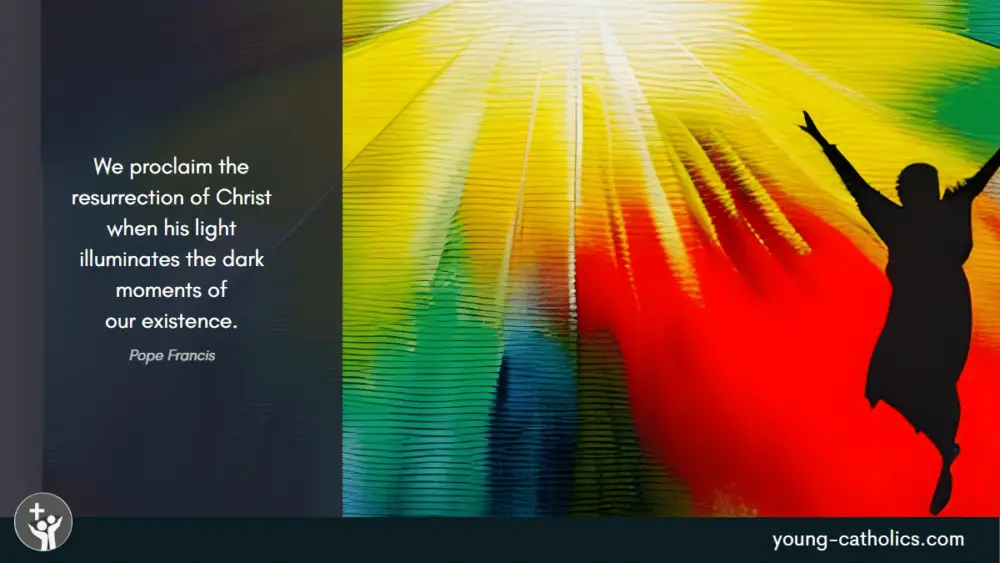
Music Suggestions for Easter
Sunday April 5, 2026
Easter, a season of rebirth and renewal, invites us to explore the depths of joy, redemption, and divine love through music. These selections encompass a broad spectrum of themes from liberation and victory over death to the profound love and grace bestowed upon us. From traditional hymns that have echoed through centuries to contemporary worship songs that capture the spirit of modern faith, this collection offers a rich tapestry of sounds to enhance your Easter celebrations.
- Agnus Dei by Michael W. Smith
- Alleluia! Love Is Alive by Steve Angrisano, Jesse Manibusan & Sarah Hart
- Amazing Grace, My Chains Are Gone by Louie Giglio
- Canticle of the Free by Janét Sullivan Whitaker
- Christ Is Risen by Matt Maher & Mia Fieldes
- City of God by Dan Schutte
- Hail the Day that Sees Him Rise by Trevor Thomson
- Hallelujah / Your Love Is Amazing by Phillips, Craig And Dean
- I Am Free (Who the Son Sets Free) by Newsboys
- I Know that My Redeemer Lives by Scott Soper
- Jesus Christ Is Risen Today by Ken Lewis & Scott Dente
- Joyful Joyful We Adore Thee by Amy Grant
- Love Divine All Loves Excelling by Rowland H. Pritchard & Charles Wesley
- Mighty to Save by Laura Story
- River of Glory by Dan Schutte
- Shout Hosanna by Passion
- This Is Amazing Grace by Phil Wickham
- This Is the Day (Psalm 118) my Michael Joncas
- Ye Sons and Daughters by Josh Blakesley
Each piece serves as a vibrant testament to the power of resurrection and the boundless love of God. These songs, with their diverse styles and themes, invite us to rejoice, contemplate, and worship, reminding us of the hope and freedom found in Christ’s victory over death. Add your own suggestions to the comments.
Questions and Answers
What is Easter?
Easter is the most important and oldest festival of the Christian Church, celebrating the resurrection of Jesus Christ on the third day after his crucifixion, as described in the New Testament. It marks the culmination of the Passion of Jesus, preceded by Lent, a 40-day period of fasting, prayer, and penance.
What date is Easter?
Easter is celebrated on the first Sunday following the full moon that occurs on or after the spring equinox (March 21), which means it can fall between March 22 and April 25. The date varies each year according to the lunar calendar.
Why is Easter important in the Catholic faith?
Easter is central to the Catholic faith as it commemorates the resurrection of Jesus Christ, which is the foundation of Christian belief. The resurrection signifies Jesus’ victory over death, offering the promise of eternal life to those who believe in him. It’s a celebration of renewal, hope, and salvation.
What are the key events leading up to Easter?
The key events include:
- Palm Sunday: Marks Jesus’ triumphant entry into Jerusalem.
- Holy Thursday: Commemorates the Last Supper of Jesus with his disciples.
- Good Friday: Observes the crucifixion and death of Jesus.
- Holy Saturday: A day of reflection on Jesus’ death and burial.
- Easter Sunday: Celebrates the resurrection of Jesus from the dead.
What is the Octave of Easter?
The Octave of Easter refers to the eight-day period that begins on Easter Sunday and ends on the following Sunday, known as Divine Mercy Sunday. In the Catholic Church, this period is treated as one continuous celebration of the resurrection of Jesus Christ. Each day of the Octave is considered as solemn as Easter Sunday itself, emphasizing the importance and joy of the Resurrection.
What are some Easter traditions in the Catholic Church?
- The Easter Vigil: Held on Holy Saturday night, it is the most significant and sacred liturgy of the Catholic Church. It includes the lighting of the Paschal candle, the Liturgy of the Word, baptism and confirmation of new members, and the Eucharist.
- Easter Mass: Celebrated on Easter Sunday, it rejoices in the resurrection of Jesus.
- Blessing of Easter foods: In some cultures, baskets of food are brought to the church to be blessed on Holy Saturday or Easter Sunday.
- The use of Holy Water: Reminding the faithful of their baptism and the promises made to renounce sin and profess faith in Christ.
How can one prepare for Easter?
Preparation for Easter typically involves observing Lent, a season of repentance, fasting, and preparation for Easter. It begins on Ash Wednesday and lasts for 40 days, mirroring Jesus’ fasting in the wilderness. Catholics are encouraged to pray more fervently, give alms, and fast, abstaining from certain foods or habits to purify their bodies and souls.
How is Easter celebrated outside of church services?
Easter celebrations outside of church often include family gatherings, festive meals, and, in many cultures, the exchange of Easter eggs, which symbolize new life and resurrection. Communities may also participate in processions, plays depicting the Easter story, and other events that reflect the joy and hope of the resurrection.
The Hope and Joy of Easter Sunday
Easter Sunday is the most important celebration in the Christian calendar. It marks Jesus’ victory over sin and death through His Resurrection. This event is the cornerstone of the faith, offering believers hope for eternal life. The Easter readings reflect God’s goodness and saving work throughout history, showing His power to bring freedom and new life to His people.
Key themes of Easter include renewal and redemption. Jesus’ sacrifice and Resurrection bring forgiveness of sins and invite us to live in a renewed relationship with God. St. Paul emphasizes dying to sin and being raised to new life through baptism. This reminds us to focus on heavenly things and trust in God’s promises.
Easter is also a time of joy and unity. The Resurrection calls Christians to come together in celebration, sharing the Good News with others. It invites us to reflect on how faith in Jesus transforms our lives and strengthens our connection with God and one another.
As we rejoice in the Resurrection, Easter Sunday encourages us to embrace new beginnings. It reminds us to turn away from sin and live with hope, joy, and trust in God’s saving grace.
Your Turn
Easter Sunday is a time to celebrate and reflect on the Resurrection of Jesus. Think about the themes of hope, renewal, and unity. How do they shape your faith and daily life? Consider the call to turn from sin and live for God.
Share your thoughts in the comment section below. How has Easter impacted your journey of faith? Your reflections could inspire someone else to grow closer to Jesus and embrace the hope that Easter brings.

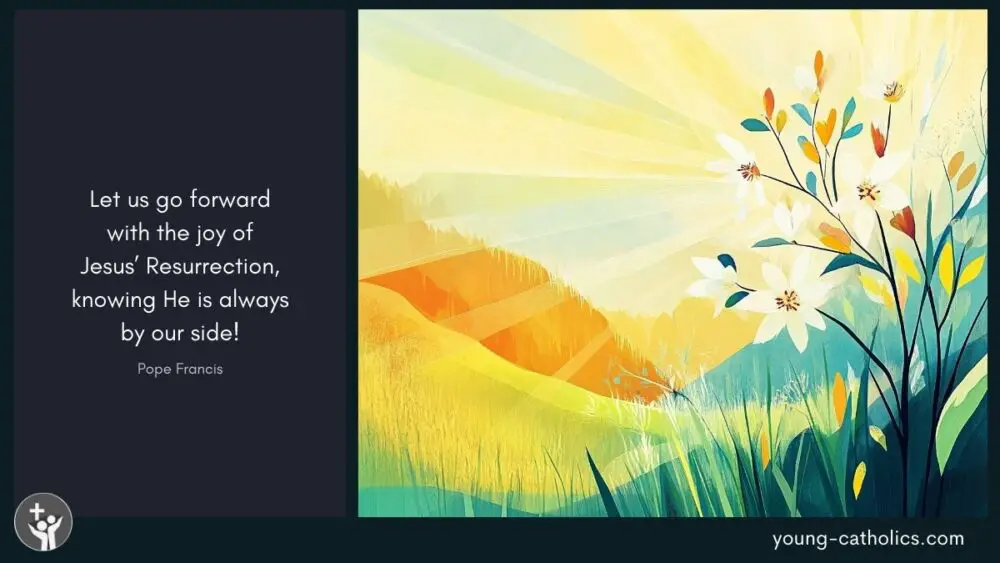
Leave a Reply